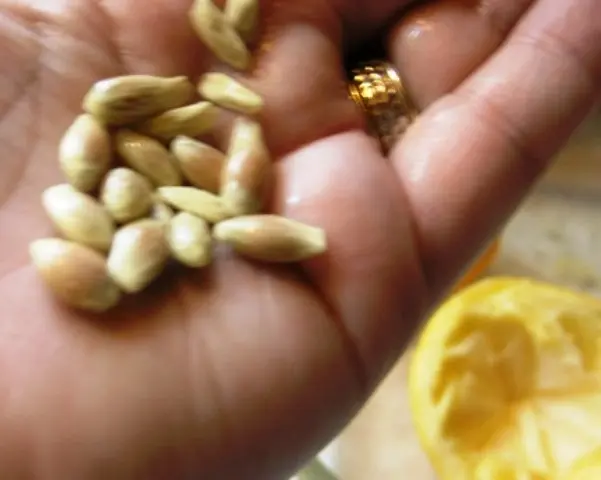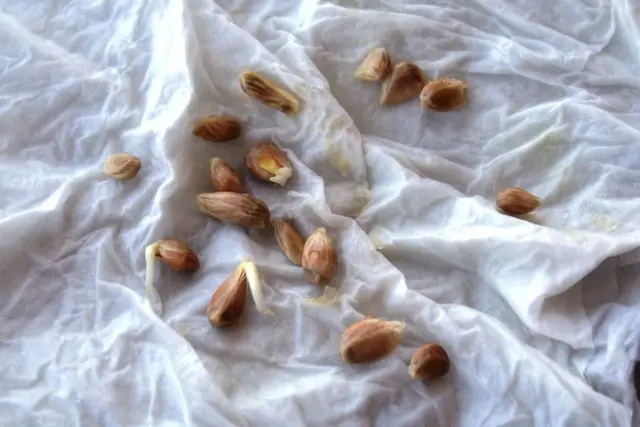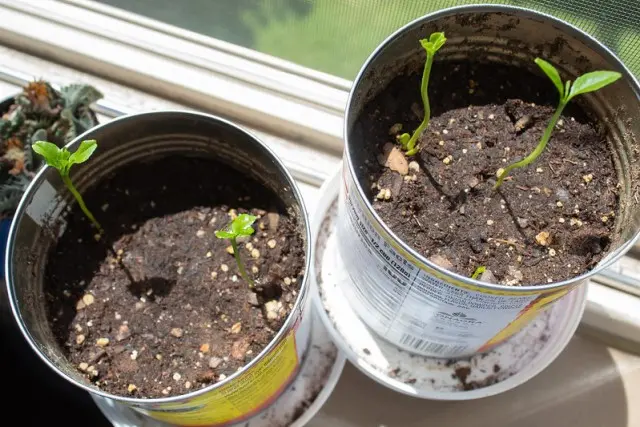Growing lemons from store-bought lemons is an exciting and rewarding process that allows you to cultivate your citrus trees from the seeds of the fruit you enjoy. While the journey from seed to fruit-bearing tree requires patience, attention, and specific steps, the results can be a flourishing lemon tree right in your own home.
Selecting the Right Lemon:
Start by choosing a high-quality, organic lemon from the store. Organic lemons are preferred to avoid exposure to chemicals that might hinder germination. Look for a lemon with plump seeds, as these are more likely to be viable for planting. The fresher the lemon, the better the chances of successful germination.

Extracting the Seeds:
Once you have your lemon, cut it open and extract the seeds. Carefully remove any surrounding pulp, as it can attract mold and hinder germination. Rinse the seeds under cool, running water to eliminate any remaining pulp residue. Be gentle to avoid damaging the seeds during this process.
Pre-germination Preparation:
To enhance germination, some gardeners choose to pre-soak the seeds overnight. Place the seeds in a small bowl of lukewarm water, allowing them to soak for 12 to 24 hours. This can soften the seed coat and kickstart the germination process.

Germination in a Paper Towel:
One common method for germinating lemon seeds is using a paper towel. Follow these steps:
- Dampen the Paper Towel: Moisten a paper towel with water until it is damp but not soaked. Excess water can lead to mold growth.
- Seed Placement: Place the lemon seeds in the center of the damp paper towel, ensuring they are evenly spaced.
- Folding and Sealing: Fold the paper towel over the seeds, creating a packet. Place the folded paper towel with the seeds in a sealable plastic bag, ensuring it is partially sealed to maintain a humid environment.
- Dark, Warm Location: Store the plastic bag in a warm, dark place, such as on top of the refrigerator or in a cupboard. The ideal temperature for germination is around 70-75°F (21-24°C).
- Check and Maintain Moisture: Check the paper towel every few days to ensure it remains moist. Spritz it with water if needed, but avoid overwatering to prevent mold.

Transplanting Germinated Seeds:
After about two weeks, you should see tiny sprouts emerging from the seeds. Once the sprouts are a couple of inches tall, it’s time to transplant them into soil.
- Prepare Seedling Pots: Fill small seedling pots with well-draining potting mix. Ensure the pots have drainage holes to prevent waterlogging.
- Transplant Carefully: Gently transplant the sprouted seeds into the pots, burying them about an inch deep in the soil. Water the soil lightly after transplanting.
- Provide Adequate Light: Place the pots in a location where the seedlings receive plenty of sunlight. If sunlight is limited, consider using a grow light.
Caring for Lemon Seedlings:
As your lemon seedlings continue to grow, there are key care practices to ensure healthy development:
- Sunlight: Lemon trees thrive in full sunlight. Ensure your seedlings receive at least 8 hours of direct sunlight daily. If growing indoors, place them near a south-facing window or use a grow light.
- Watering: Keep the soil consistently moist but not waterlogged. Allow the top inch of soil to dry out between waterings.
- Fertilizing: Once your seedlings have a few leaves, start fertilizing them with a balanced citrus fertilizer. Follow the product’s instructions for application rates.
- Pruning: As your lemon tree grows, consider pruning to encourage a strong and well-shaped structure. Remove any dead or damaged branches and shape the tree as desired.

Transitioning to Larger Containers:
As your lemon tree grows, it will outgrow its initial seedling pot. When the roots become visible at the bottom of the pot, it’s time to transplant it into a larger container. Choose a container with good drainage and gradually increase the size as the tree grows.
Patience and Time:
Growing a lemon tree from store-bought lemons is a process that requires patience. It typically takes several years for a lemon tree to mature and produce fruit. During this time, continue providing proper care, and you’ll be rewarded with a thriving lemon tree that can eventually yield delicious fruits.
Conclusion:
Growing lemons from store-bought lemons is a satisfying and educational experience. It allows you to witness the journey from a tiny seed to a flourishing tree that bears the fruits you love. By following these steps and providing consistent care, you can cultivate your own lemon tree, bringing a touch of citrus freshness to your home. Remember, each lemon tree is unique, and the fruits it produces may have variations, but that only adds to the charm of growing your own citrus tree from seed.
FAQs
How to germinate lemon seeds in a paper towel?
To germinate lemon seeds using a paper towel, start by moistening a paper towel with water, ensuring it is damp but not soaking wet. Next, extract the seeds from a fresh lemon, making sure to remove any pulp. Place the seeds in the center of the damp paper towel and fold it over to cover them. Seal the paper towel in a plastic bag, creating a semi-closed environment that retains moisture. Store the bag in a warm and dark place, mimicking the conditions necessary for seed germination.
Check the paper towel every few days to ensure it remains moist, but avoid overwatering to prevent mold growth. Within a couple of weeks, you should observe the emergence of tiny sprouts from the lemon seeds. Once the sprouts are a few inches tall, carefully transplant them into pots with well-draining soil. Provide adequate sunlight and water, and watch as your lemon seeds transform into thriving seedlings, ready to embark on their journey towards becoming fruitful lemon trees.
How long does it take to grow a lemon tree?
Growing a lemon tree from seed is a patient endeavor. It typically takes several years for a lemon tree to reach maturity and bear fruit. From germination, the seedling phase spans about 2-4 years, during which the tree develops its structure. Following this, the juvenile period lasts another 2-3 years, with the tree focusing on growth rather than fruiting. Ultimately, it can take 3-7 years, or even longer, for a lemon tree to mature and produce its first fruits. Factors like climate, care, and the specific lemon tree variety can influence the overall timeline of this rewarding horticultural journey.
Do lemon trees grown from seed produce fruit?
Lemon trees grown from seed can produce fruit, but it’s important to note that the resulting fruit may differ from the parent lemon and can take several years to appear. Additionally, lemon trees grown from seed may not consistently yield fruit similar to the original lemon they came from, as they may exhibit variations in flavor, size, and other characteristics. Commercially, many lemon trees are propagated through grafting or other asexual methods to ensure desirable traits. While growing a lemon tree from seed can be a rewarding experience, those seeking consistent and specific fruit characteristics may opt for other propagation methods.
How to grow lemon trees faster?
To accelerate the growth of lemon trees, several key practices can be employed. Ensure the tree receives ample sunlight, ideally at least 8 hours daily, promoting photosynthesis and robust growth. Plant the tree in well-draining soil enriched with organic matter, maintaining consistent moisture levels without waterlogging. Regular fertilization, particularly with a balanced citrus fertilizer, aids in providing essential nutrients. Pruning helps shape the tree and encourages lateral growth. Adequate spacing and good air circulation prevent diseases. Additionally, protecting the tree from extreme weather conditions, such as frost, and providing occasional deep watering during dry spells contribute to fostering a healthy and faster-growing lemon tree.
MORE POSTS:
